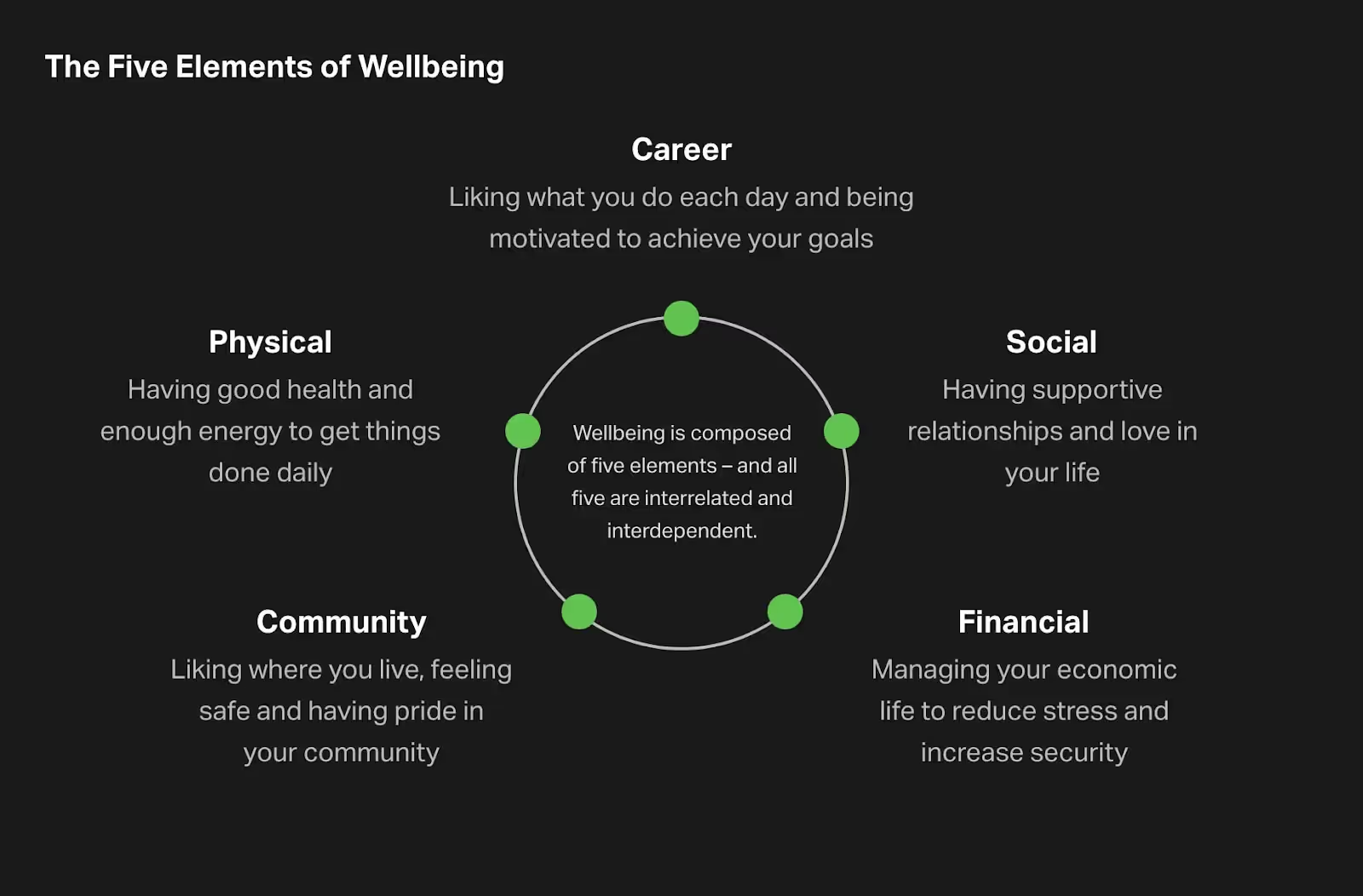Note: This article synthesizes the work and thoughts of various leaders on the subject of self-care in UX research and beyond. We have done our best to clearly cite the original speakers and authors, whom we would like to thank for driving this conversation forward and influencing our interest in this subject. Those voices include: Dr. Christelle Ngnoumen, Babz Jewell Hall, Vivanne Castillo, Amy Jen Su, Rachael Dietkus, Paul Derby, Cindy McCracken, Kate Kalcevich, Tiffany Eaton, Alec Levin, Jon Berbaum, Joseph Bramall, Dominika Prikrylova, and Nikki Anderson-Stanier. We made edits to this article based on feedback, which we tracked and have made available as a PDF.
According to a systematic literature review published in BMC Public Health, economic recessions—like the one experts are predicting for 2023—are associated with a significant uptick in poor mental health outcomes.
The good news is that not everyone believes a recession is inevitable.
The bad news is that mental health outcomes were on the decline anyway, a phenomenon exacerbated by the pandemic, an underfunded mental health care system, and other social factors causing high anxiety and depression.
And that decline has touched the workplace, too.
Corporate Wellness Magazine’s 2022 State of Workforce Mental Health Report found that employees’ mental health is at an all-time low, with 84% of workers reporting at least one mental health challenge over the past year and 31% reporting a decline in their mental health compared to 2021.
In times like these, user research leaders and practitioners need strategies for managing stress and maintaining work-life balance.
To help you stay centered in 2023 and beyond, we’ll discuss:
- Why UX research can be an emotionally taxing career
- How to recognize a lack of self-care in yourself and others
- The 5 elements of workplace wellbeing
- How to recenter yourself (and stay centered)
🔬 Why is UX research such an emotionally taxing career?
“Stress is the biggest bias generator we have to contend with in our work.” – Dr. Christelle Ngnoumen, Principal User Experience Designer at Headspace Health at YouX 2023
UX research—similar to jobs like social work and psychotherapy—involves deep listening and empathy. When the core functions of your job are to care, listen, empathize, and advocate, it’s common to experience things like compassion fatigue.
Compassion fatigue (sometimes referred to as vicarious trauma) describes an emotional and psychological strain experienced in “helping” professions like nursing, therapy, or social work. Repeated exposure to (and empathy for) people experiencing stress or trauma can cause anxiety, depression, burnout, and other mental health challenges that spill over from your professional life into your personal life.
Of course, that doesn’t mean that the care and advocacy work that researchers do is inherently bad or unhealthy. On the contrary, empathy is one of the strengths of user researchers and benefits of user research. As Babz Jewell, Qualitative Researcher at U.S. Digital Response, says on the Awkward Silences podcast:
“I like to think about empathy as creating a product where you humanize customers. And also a part of that critically is humanizing your colleagues and stakeholders. And then through humanizing and focusing on people's experiences, you can bridge these gaps between perspectives. You can fill knowledge gaps by listening, by really listening and hearing people.”
However, Babz explains that empathizing with users also requires “de-centering” yourself as a researcher:
“I don't really think the goal of empathy is to lose yourself or dissolve yourself, but more specifically locate yourself as an interpreter. As somebody who’s collaborating with empathy, of course, I think practicing empathy involves de-centering yourself.”
This process of de-centering yourself to have honest, 1-on-1 conversations with folks can take an emotional and psychological toll. If you’re not consistent and intentional about re-centering yourself, then the stress can start to impact your mental health and productivity.
That’s why a regular self-care practice is essential to your success in UX research. Vivianne Castillo, Founder at HmntyCntrd, speaks extensively about the importance of self-care for UX researchers:
“I've noticed and have talked to UX professionals who are sharing how they're exhausted. They're sharing about how they're having these flashbacks of conversations, difficult conversations that have occurred, and in many ways they're starting to share these symptoms that, for me, I'm like, ‘Wow, this is compassion fatigue.’ Or talking to people who work with marginalized groups a lot and hearing, ‘Wow, they're experiencing vicarious trauma.’ We talk a lot about caring for other people, advocating for other people, but our industry is missing the other side of the coin, which is about caring for ourselves and knowing how to advocate for ourselves and our needs as well.”
Now, you might be thinking: “I do take care of myself. I get my job done and my life is in order. What more should I have to do?”
I hate to break it to you, but—checking all the boxes doesn’t necessarily equate to self-care. In the next section, we’ll take a look at how to recognize a lack of self-care in yourself and others and then provide a framework for wellbeing.
🪫 What does a lack of self-care at work look like?
Executive Coach Amy Jen Su works with leaders to help them practice self-care and support their overall performance. According to her article in Harvard Business Review, a lack of self-care can manifest in four common ways:
1. Self-neglect
Self-neglect is a failure to assert your own boundaries, attend to your own needs, and adequately care for your mental and physical health.
If you’ve slipped into a pattern of self-neglect, you might notice yourself:
- Skipping workouts in the morning to make it to early meetings
- DoorDash-ing junk food instead of meal prepping
- Letting dishes and laundry pile up because you’re too tired to do them
2. Self-management
Self-management is the ability to regulate your own behavior and emotions and hold yourself accountable for getting things done.
In small doses, self-management isn’t a bad thing–it’s what allows you to communicate professionally, make effective decisions, and meet deadlines. But an excess of self-management can cause challenges both at work and at home.
Over-managing yourself might look like:
- Suppressing or denying emotions, especially through unhealthy coping mechanisms like one, two, three extra drinks after work
- Missing out on fun experiences with friends and family because you’re too tired, overbooked, or worried about “letting go of the facade” for any length of time
- Becoming easily angered or unduly upset when others fail to meet your expectations
3. Self-sabotage
Self-sabotage is the act of (consciously or unconsciously) preventing yourself from achieving your goals.
Often, self-sabotage occurs from a place of fear—fear of failure, fear of commitment, fear of not being good enough, or fear of directly addressing challenges.
Whatever the cause, self-sabotage might manifest itself as:
- Procrastinating on difficult tasks, even as the deadline looms closer
- Choosing to stay up late with friends even though you have an important presentation in the morning
- Handing in sloppy, unfinished work even though you’re capable of doing the job well
4. Self-preservation
Self-preservation is the ability to protect yourself from harm.
Like self-management, self-preservation isn’t inherently a bad thing. As humans and as employed professionals, it’s natural to want to protect ourselves and our careers.
But when your time, energy, and resources are stretched thin, you might fall into fight-or-flight mode trying to stay afloat. And when hundreds of thousands of employees have been laid off in the past 3 years, your instinct to self-preserve may have (understandably) gone into overdrive.
Excessive amounts of self-preservation might look like:
- Being reluctant to collaborate or overly critical of other peoples’ work
- Throwing your peers under the bus by blaming them for your mistakes (or failing to share the responsibility for shared outcomes)
- Taking credit for other peoples’ ideas to make yourself look good
5. Self-ignorance
Along with the four that Amy Jen Su laid out, I would also add self-ignorance to this list. Self-ignorance is a lack of understanding about yourself, your needs, and your limits.
Sometimes, stress piles up because you’re not sure what to do to relieve it—or, the self-care strategies that work for other people don’t seem to work for you. Developing the self-awareness to recognize and adequately fulfill your unique needs is a prerequisite for wellbeing.
Ultimately, this self-awareness needs to be accompanied by a sense of self-trust, too; once you know what to do, you have to trust yourself to act on it. As Rachael Dietkus, Founder & Chief Compassion Officer at Social Workers Who Design, says:
One of the most profound aspects of caring for oneself *and* caring for others is attuning to our self-trust. I believe we often inherently know what to do in so many situations but we’ve been conditioned by distraction and busyness and chaos. Self-trust allows us to have the courage in our convictions and honor them.
Self-ignorance might manifest itself as:
- Overbooking yourself because you’ve underestimated the amount of time or effort tasks will take
- Ignoring, deflecting, or denying constructive feedback from your peers or manager
- Forcing yourself to sit activities that you don’t enjoy or find draining because “it’s supposed to be good for you”
🔋 The 5 elements of wellbeing
“Wellness is the process by which we become aware of and take actions to promote good health. This encompasses our physical, mental, social and environmental well-being.” – Dr. Christelle Ngnoumen, Principal User Experience Designer at Headspace Health
We’ve established what a lack of wellbeing (due to a lack of self-care) looks like. Now, what does it mean to “be well?”
According to Gallup research, workplace wellbeing consists of 5 core elements:
- Career: Liking what you do each day and being motivated to achieve your goals
- Social: Having supportive relationships and love in your life
- Financial: Managing your economic life to reduce stress and increase security
- Community: Liking where you live, feeling safe and having pride in your community
- Physical: Having good health and enough energy to get things done daily

All five of these elements are interrelated—they influence each other, and improving one can have a positive impact on the others.
Some of these elements are mostly under your control. For example, you can maintain physical well-being by getting enough sleep, exercising regularly, and eating balanced meals. You can also improve your social and community wellbeing by prioritizing relationships outside of work and looking for opportunities to connect with your coworkers (this is especially important in remote environments).
However, some of these elements will require a combination of your own personal commitment and the support of your team and organization. For example, your financial health depends, in part, on your salary, but it also has a lot to do with your personal relationship to money and how you spend (or save) it.
As you’re evaluating your own well-being as a researcher, be sure to consider both what you can do and how your organization can support you for each element.
.avif)
⚖️ Feeling unbalanced lately? Here’s how to recenter yourself.
If you’ve noticed your self-care routine slipping lately (or never really had one in the first place), don’t fret! Everyone gets off track from time to time.
Here are some steps you can take to recenter yourself:
- Learn to identify your personal and professional stressors.
- Check in with yourself regularly.
- Find a mentor, coach, or “mirror.”
- Practice mindfulness.
- Communicate your value to establish community and connection across the organization.
- Don’t let perfect be the enemy of good.
- Be curious about criticism (from yourself and others).
- Set (and enforce) boundaries.
- Lessen your workload.
- Don’t waste your time, money, and energy on low-quality participants.
- Celebrate wins.
- Stay hydrated, healthy, organized, and inspired.
- Nurture your life outside of work.
- Forgive yourself for your mistakes.
1. Learn to identify your personal and professional stressors.
Identifying what stresses you out and why is the first step to appropriately dealing with those stressors. As Vivianne Castillo explains in The Most Important Thing You’re Not Doing As a UX Designer:
“We need to understand the context around what self-care means for you and how to personalize it in a way that addresses both the personal issues and orthodoxies you bring, and the issues that are birthed from the cultural, institutional, and systemic issues within our workplaces. Otherwise we’ll mistakenly address the symptoms instead of treating the root of the problem, which often results in burnout masked as depression.”
For help identifying your stress triggers, take a look at this questionnaire, originally published in Transforming the Pain: A Workbook on Vicarious Traumatization and adapted by Vivianne Castillo for UX professionals.
2. Check in with yourself regularly.
As I mentioned earlier, self-ignorance can cause you to unwittingly neglect your own health needs. The first step you can take to combat self-ignorance is to check in with yourself regularly.
Simply ask yourself: How am I feeling? Why am I feeling that way?
You can do this check-in in your head, but keeping a journal also helps for recognizing long-term trends in your mental and emotional state.
Make note of things like:
- Anxiety
- Social withdrawal
- Poor sleep
- Feelings of self-contempt
- Weight loss or gain
- Headaches
- Significant decrease in job satisfaction
- Increase in colds or common illnesses
- Irritability
- Restlessness
These could all be signs that it’s time for a reset.
3. Find a mentor or coach.
People who do research place a high value on mentorship, and for good reason. Mentors can help you not only with achieving your career goals, but also with developing the self-awareness to recognize and address mental health challenges.
If you struggle to recognize when your mental health is suffering, designate someone to be your “mirror”. Even if you don’t have a formal mentor or coach, you could ask a friend, coworker, or family member who you trust. As Vivianne Castillo explained in this episode of Awkward Silences:
“I always talk to people about how important it is to have those one or two people, either in your professional space or your personal space, that you know you can always be 100% vulnerable and honest with, with what's going on in your work and what's going on in your personal life. I personally have those people, and I've talked to them about, ‘Hey, if there's a blind spot that's happening even as I'm talking about work, as you're hearing how often am I talking about work in our conversations, please let me know, please help me see things and hold me accountable.’”
Paul Derby, Senior Manager, User Experience Research at ServiceNow, provides tips for asking someone to be your mentor in the Q&A for his YouX 2023 panel on mentorship:
- Clarify the challenge you’re experiencing.
- Intentionally choose people who have the experience, skills, or knowledge to help you with your challenge.
- Make your request short, specific, and direct.
- Accept that recipients may not respond or may reject your request.
- For more information, check out Paul’s article, “Reaching out to Mentors in the UX Research Community.”
4. Practice mindfulness.
Mindfulness is the ability to bring your focus to the present moment, wherever you are, and whatever you’re doing. It’s a “centering” process that can help you maintain your composure during stressful situations.
As Dr. Christelle Ngnoumen, Principal User Experience Designer at Headspace Health, describes in the Q&A for her YouX session, “Wellness and UX: Going Beyond the User Experience”:
“Centering the self can be a helpful (and even necessary) way to regain equilibrium when experiencing stressful moments. Centering techniques like attending to our internal cues (e.g., body scan) and reframing (e.g., reframing a problem as an opportunity) bring the individual to the present moment and can help expand their perspective.”
One question that comes up a lot on the topic of mindfulness is: Is it better to meditate more frequently or for a longer period of time? In other words, is one 30-minute daily session more beneficial than three 10-minute sessions throughout the day?
Christelle answers this question in her YouX Q&A:
“The short answer is any bit of meditation is better than none! The more nuanced response is that the benefits of meditation are predicted more by frequency than by duration. So it’s better to spend those three 10 minute sessions throughout the day. A lot of research shows many of the benefits of meditation come from the consistency of the practice, rather than the duration. In other words, it's more beneficial to meditate every day for shorter periods of time rather than once a week for a longer period.”
If you’re new to mindfulness meditation and not sure where to start, there are plenty of apps and resources out there designed to be accessible for beginners, including:
5. Communicate your value to establish connection and understanding across the org.
It’s a hill all researchers have to climb: gaining stakeholder buy-in for UX research.
When your colleagues and stakeholders don’t fully understand the value of user research, you’ll struggle to obtain the trust and resources to do your job effectively. This lack of support can be incredibly stressful and lead to a compounding decline in your ability to make an impact.
The best way to preempt (or reverse) this challenge is to:
- Connect with other teams—especially Product and Design, but also Success, Sales, and Marketing
- Learn their experience and expectations regarding research
- Align on company-level and team-level goals
- Educate them on research’s role in achieving those goals
As Cindy McCracken, Senior User Experience Researcher at LexisNexis explains:
“The more you work with co-workers such as support, sales and development and show them the value of UX, the more support you will have within the organisation.”
In the Q&A for her YouX 2023 talk, “Research for All: Building Healthy Teams Through Democratization”, Kate Kalcevich, Head of Accessibility Innovation at Fable, discusses the risks of not effectively communicating your value to the rest of the organization:
“Regardless of democratization or not, I think teams in general have to be aware of how they communicate the value that they bring. I used to create quarterly accessibility reports for leadership to share an overview of progress being made. I think when orgs don’t know what a team contributes, there’s always risk. You’ll see this in the form of unrealistic expectations on timelines and volume because there’s not a senior champion who is raising awareness and advocating for the team. I see it more as an opportunity to elevate the team, not reduce it.”
6. Don’t let perfect be the enemy of good.
Sometimes, the best way forward is to take a step back.
With everything on your plate from recruiting to synthesizing insights and making recommendations, there’s only so much you can accomplish as just one person. You may not be able to do everything perfectly, but you’re probably capable of doing everything well. Learn to recognize when enough is enough and don’t beat yourself up over the things you weren’t able to accomplish.
“A part of it is knowing when good is good enough. I think sometimes, especially for us, we often feel like we have to carry this mantle of being the advocate and the champion. And I think sometimes we have to be able to step back and recognize there's only so much you might be able to communicate to a certain stakeholder, whether it's on that particular project or even within the scope of our time being at that company.”
Remember, perfectionism is a defense mechanism, not an attainable goal. Focusing too much on being perfect will cloud your outlook and cause you to get in your own way, as Tiffany Eaton, Interaction Designer at Google, describes in the Q&A for her YouX 2023 Panel, “Reframing the Imposter Syndrome”:
“I also try to remember that it’s okay to take my time and approach a looming issue in small steps. This means not expecting perfection, especially if something is new and to ask for feedback and tips when it is work or even life related. This can save a lot of time from overthinking and letting negative energy consume your outlook.”
Plus, being wrong sometimes is just an opportunity to learn, as Alec Levin of the UXR Collective discusses on the Awkward Silences Podcast:
“If you’re batting 100% on all your points of view, you’re not trying hard enough. You’re working on stuff that’s too easy.”
7. Be curious about criticism (from yourself and others).
As a researcher (and, more generally, as a human being), you’ll likely run up against both inner critics and outer critics whose feedback might upset, undermine, or demotivate you.
Your inner critic is the voice in your head telling you that your work wasn’t good enough, you’re a fraud, you don’t belong, etc. When you hear from your inner critic, ask yourself:
- Where is this perspective coming from?
- Is this criticism actually reflective of my work?
- What would I say to a friend in the same situation?
Instead of letting your inner critic ruin your mood and motivation, take a moment to get curious about the source of this inner dialogue. Reframe it as if you were speaking to a friend or a child—be reasonable, kind, and forgiving with yourself.
Outer critics may come in the form of colleagues, stakeholders, participants, or other folks you work with. Hopefully, most of the people you work with will understand how to give compassionate, constructive feedback that doesn’t crush your spirit. When you do get feedback that’s delivered poorly or upsets you for any other reason, the best way to respond is with curiosity.
As Highland President Jon Berbaum says:
“If you’re caught off-guard by strong critical feedback, my first bit of advice is to ask questions. If a stakeholder is reacting, keep asking questions to tease out what they’re reacting to. This can often lead to insights and can help you move the conversation forward.
Luckily, as a researcher, you’re already great at asking questions. 😉
8. Set (and enforce) boundaries.
Boundaries are rules about what you will and will not accept in your life, determined by your personal values. At work, boundaries are a healthy way of saying no to things that you don’t feel comfortable with, aren’t your responsibility, or would negatively affect your mental health.
As Service Designer Joseph Bramall explains, setting appropriate boundaries protects your time and energy for healthily processing the events of your day:
“Empathy is taxing. Taking on other people’s emotions and thoughts leaves your mind running on empty. We don’t allocate time to process and sort. At the peak of project activity we become entangled with everything and everyone.”
Set and enforce your boundaries at work by:
- Prioritizing value-adding projects to make the best use of your time.
- Rescheduling meetings and research sessions when you need to.
- Setting a time schedule to check emails, so you’re not distracted by them all day.
- Separating your self-worth from your work to keep work stressors from spilling over into your personal life.
- Allowing a buffer period between research sessions to give yourself time to process and minimize panel fatigue.
Allowing buffer time between sessions (ideally 15 minutes or more) is especially helpful for user researchers and participants. In “Self-care is participant-care: a holistic view of interviewing as a UX researcher,” Kontent.ai’s UX Researcher Dominika Prikrylova describes how these buffer moments can set the tone for sessions with participants, ultimately affecting the results of your research:
“We’re not robots that recite questions. We’re people first, and UX researchers second (and lots of other roles in between). The mood we set at the beginning will inevitably be the same throughout the interview. Our bad moods are contagious, and giving ourselves a moment of peace before an interview is self-care 101.”
9. Lessen your workload.
In 2023, everyone is looking for ways to do more with less.
There are a number of tools, frameworks, and strategies you can use to lessen your workload as a researcher, including:
- Research Ops Managers (or standardized frameworks, in the absence of a dedicated ReOps hire) to streamline research processes and provide company-wide education.
- Tools like User Interviews to simplify all aspects of participant recruitment and panel management, from screening participants to distributing incentives.
- Insights repositories to stretch the value of existing research and help you avoid “throwaway” studies that aren’t necessary, relevant, or particularly insightful.
- Research enablement (AKA democratization) to help non-researchers lead and conduct their own research without drawing on the limited capacity of the core UXR team.
- Productivity hacks like creating templates and checklists for recurring tasks, differentiating between your must-have and nice-to-have criteria for participants before you start recruiting, and overscheduling to accommodate for no-shows.
- Honesty—if you feel like your workload is unmanageable or so overwhelming that you’re on the verge of burnout, talk to your manager.
🛡️ For more tips on how to navigate budget cuts and uncertainty in 2023 as a user researcher, read “5 Ways to ‘Recession-Proof’ Your 2023 User Research Plan.”
10. Don’t waste your time, money, and energy on low-quality participants.
With a recession looming, the last thing you want to do is spend limited time, money, and mental/emotional energy working with low-quality participants.
Streamlining your recruitment process will lift a heavy weight off your shoulders as a researcher. To make sure you’re attracting only the right people to participate in your studies, make sure you:
- Know your audience (and how to target them)
- Create concise, pointed screener surveys to weed out unqualified applicants
- Write compelling research invitations to boost response rates
- Recruit enough people to meet your ideal sample size
- Build your own research panel for quick access to niche, pre-screened audiences
Additionally, consider using purpose-built recruiting and panel management tools like User Interviews to help you find, screen, schedule, and compensate participants without the headache.
User Interviews is the fastest, easiest way to recruit high-quality participants for UX research. Get insights from any niche within our pool of over 2 million participants through Recruit or build and manage your own panel with Research Hub, the #1 panel management solution designed for researchers.
Check out our pricing page to learn more about flexible research recruiting plans for any team.
11. Celebrate wins.
Too often, researchers are so focused on growth and improvement that they forget to pause and reflect on their successes.
Nikki Anderson-Stanier, Founder & Managing Director at User Research Academy, describes this failure to celebrate as one of the core causes of imposter syndrome. As she suggests in the YouX 2023 Conference Panel “Reframing the Imposter Syndrome”:
“Think about your accomplishments and… actually take the time to, I don't know, dance, scream, have a drink, take a bath, go for a walk. Do something as a reward.”
Nikki also recommends keeping a “smile folder” or “brag document” to record any accolades your colleagues have given you—it’s a great resource to fall back on when you’re feeling unsure of yourself!
Think you’re too busy to celebrate? Schedule it into your to-dos. Set weekly, monthly, and/or quarterly reminders on your calendar or preferred project management tool to reflect on what you accomplished in the past cycle.
Don’t forget to celebrate your peers, too. What goes around comes around.
12. Stay hydrated, healthy, organized, and inspired.
Your physical health and your environment are both closely related to your mental health. Take care of them to influence a more positive mental state.
Here are some tips for maintaining good health and creating a work environment that inspires you to be your best:
- Drink enough water and focus on balanced nutrition.
- At the end of every day, set a timer for 60-seconds to clean and organize your desk at the end of the day.
- Take the time to stretch at your desk. Here’s a great 14-minute office break yoga routine to try.
- Look away from your computer screen periodically to support your eye health. Many people use the 20-20-20 framework for this—every 20 minutes, look at something 20 feet away from you for 20 seconds to prevent eye strain.
- Keep a list of inspiring words and images by your desk.
- Have lunch away from your desk to give yourself a true “break” in the middle of the day.
For more self-care-at-your-desk ideas, check out this PDF from NYS Office of Mental Health.
13. Nurture your life outside of work.
Your success at work depends on what you do outside of work, too.
Nikki Anderson-Stanier, Founder & Managing Director at User Research Academy, describes the importance on having hobbies and a support system outside of work in the Q&A for her YouX 2023 panel on imposter syndrome:
“Having a support system and things to do outside of work [helped me]. I am a fiction writer, board game and video game player, Cricut enthusiast, and Pilates lover. I challenge myself in all these different areas and also use a lot of my hobbies to relax.”
So, spend the evenings and weekends focused on living a balanced, fulfilling life. Try:
- Making time for hobbies you used to enjoy (or new ones you’ve been dying to try).
- Unplugging from social media on the weekends to give your brain a break from “doom-scrolling.”
- Surrounding yourself with good people. Reach out to old friends you’ve lost touch with, go to Meetups and other events to make some new ones, and spend time with your loved ones.
- Reading books! If you’re not sure where to start, here’s a big list of book recommendations from fellow UX researchers.
14. Forgive yourself for your mistakes.
Last, but certainly not least, remember to give yourself some grace, space, and compassion when you make mistakes.
For example, it’s easy to beat yourself up for fumbling your words or forgetting to ask key questions during a user interview—but it’s important to remember that it’s not the end of the world, and the participant will probably be understanding about that too. As Kontent.ai’s UX Researcher Dominika Prikrylova says:
“In my humble opinion, it is good to realize that we should not enter the interviews with the intention of dazzling the participants. We are not the experts in that situation, they are. Humans are empathetic creatures and have plenty of their own concerns, certainly enough to forgive our mistakes.”
⭐️ Wishing you health, happiness, and success in 2023
User research can be stressful even in the best of times. But there are concrete steps you can take to keep your shoulders high and your head on straight while you’re navigating the many ups and downs of your research career.
Remember, everyone has different needs and temperaments, and everyone’s self-care routine looks different. Hopefully, this guide has given you some ideas for finding a self-care practice that works for you—and once you do, we hope you make it a daily habit to put wellness at the forefront of your approach to research.




_1.avif)














